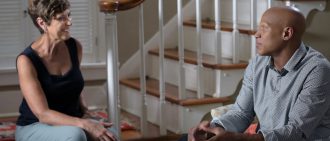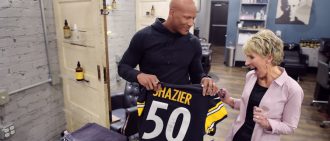Julian Cann’s road to better health came from within.
Born with the blood disorder sickle cell disease, Julian went through a series of ups and downs in his early life.
He hit a low point in 2013, around the time of a breakup.
At the time, Julian wasn’t eating nutritiously. He wasn’t exercising enough. He wasn’t living a healthy lifestyle. All those factors can cause symptoms – with severe pain the most common – or other health complications in people with sickle cell disease.
Rather than continue down the same path, Julian decided to make a change for the better.
“I just knew that I had to change that, and I had the opportunity,” Julian says. “So I just started slowly changing my diet, started changing the foods I ate. … I just started learning about better ways to live and start practicing, and then once I started seeing the benefits, I just kept going with it.”
Nutrition and exercise became one outlet. Music was another, a way for Julian to channel his pain into something positive.
Today Julian is a well-known western Pennsylvanian rapper, and he works at the Children’s Sickle Cell Foundation. He works to spread awareness about the disease and how it can be managed and overcome.
“It started off so much of a curse, and now it’s just so much of a benefit in my life,” Julian says. “It’s kind of crazy. So many different good things coming from it. I would’ve never thought it would be like that.”
Ryan Shazier’s 50 Phenoms Season 1
‘A High Burden’
Sickle cell disease is a group of blood disorders caused by mutated hemoglobin, a molecule found in red blood cells. The abnormal hemoglobin can cause the usually disc-shaped red blood cells to mutate into the shapes of crescents, or sickles. This can keep red blood cells from performing their usual duty of carrying oxygen through the body, causing severe pain and other symptoms.
It’s an inherited disease that affects about 100,000 people in the United States – including many Black Americans – and millions worldwide. Complications from the disease include strokes, infections, blood clots, organ damage and failure, and much more.
“The disease tends to cause a number of complications,” says Dr. Enrico Novelli, MD, a hematologist and oncologist and medical director of the UPMC Adult Sickle Cell Program. “It’s responsible for difficulty with achieving milestones in childhood. It also is associated with delayed milestones with limited or intermittent schooling. It is associated with difficulty of finding successful employment. There are of course relationship issues, there are cognitive concerns.
“It is a disease that carries a high burden.”
Every American state and Washington D.C. now require screening for sickle cell at birth because of the severity of the disease. Julian wasn’t diagnosed until he was 3 years old, but the disease caused him trouble throughout his childhood.
“A sickle cell crisis can mean your arm, legs, head, feet,” Julian says. “Wherever in your body that has blood cells, you can have sickle cell crisis. So it affects a lot.”
Because extreme temperature changes can cause sickle cell pain crises, he can’t go swimming. Strenuous exercise also can trigger symptoms or complications, so that took sports away.
Julian had his gallbladder removed – gallstones are a complication of sickle cell disease – and spent other significant periods in the hospital, including a two-month stretch in high school.
It affected his physical and emotional well-being.
“I had a lot of frustrations,” Julian says. “Just imagine my brothers come visit me in the hospital, and they get to go home and go to school and see girls every day, and I’ve got IVs in my arm, in pain, and they don’t have to do that. I had suicidal thoughts and all kind of stuff. I used to miss a lot of school. I didn’t go to prom because of sickle cell. I didn’t even graduate high school because of sickle cell.
“Now, I can’t blame it on that. Those are the reasons, but I decided to get my GED and just move on with life. But there was a lot of different things that I went through.”
Never Miss a Beat!
Subscribe for articles and more from Ryan Shazier’s 50 Phenoms.
Thank you for subscribing!
You can now select the specific newsletters you'd like to receive.
You are already subscribed.
Subscribe to more newsletters in our email preference center.
Sorry, an error occurred. Please try again later.
Receive text updates from Ryan Shazier’s 50 Phenoms.
‘Music Gave Me a Voice’
While he couldn’t play sports or do anything too physical, Julian discovered a talent that sickle cell couldn’t take away: music.
A fan of rappers like Jay-Z, Nas, The Notorious B.I.G., and Tupac Shakur, Julian began writing his own lyrics. And the severe pain he often felt because of his disease actually helped him.
“I used to be in this state of mind where my pain agony, I used to come up with some of the craziest stuff just as a kid,” he says. “I would come up with stuff that grown men should’ve been thinking of, and that’s what made my rhymes even better. I got to tap into a different energy that my pain, I think people could feel it in a different way.”
Once he reached high school, he started performing. He went to rap battles, or performed on the side, and “people just went crazy,” he says.
“It started getting to a point like at school, people would start coming around and just start requesting that I rap,” he says.
While he was a shy kid growing up, music helped Julian come out of his shell.
“Music gave me a voice,” he says. “Writing gave me a voice. When I was young, people really didn’t want to hear too much about what was going on. But when I would write, people would tap in.
“I always had my pen, I always had my pad when I was sick. Whether I was at the hospital or at home, I could always create through my mind. I might not have been the best guy working with my hands, but I could use my brain to come up with creative things.”
‘The Right Direction’
Music helped Julian, but it couldn’t make his disease go away completely.
There is a cure for sickle cell disease – a stem cell or bone marrow transplant. However, it requires a strong blood match between donor and recipient. The procedure also carries significant risk, including death. Because of those issues, many people can’t get a sickle cell cure and instead must learn to live with the disease.
“It’s important to remember that not everyone is affected in a similar way,” Dr. Novelli says.
People living with sickle cell disease need to stay up to date on office treatment, vaccinations, and medication. They should do their best to avoid pain triggers, including demanding workouts or extreme weather conditions. Staying hydrated and keeping a healthy, balanced diet are important.
Julian wasn’t doing that, even as his disease flared up from time to time.
“The thing about sickle cell, it doesn’t really affect you until it affects you,” Julian says. “If you had asthma, everything’s good until that attack comes. And that would come every season. Every time the weather changed, I would get sick or whatever.”
Another serious pain crisis put Julian in the hospital for more than a week in 2009. But even after that, he went back to an unhealthy lifestyle.
It all changed in 2013 when Cann decided to make his health his top priority. He said people tried to give him health advice before, but he finally took it to heart. He started reading about healthy diets and exercise and began practicing it. He cut soda pop out of his diet, switching to water. He began working out.
Slowly the changes began having an effect.
“Everything I learned was on my own, and that’s why it was better like that,” he says. “I’m not really good at people telling me what to do anyway. Once I learn, and once I know that something’s going to benefit me, I’ll be steered in the right direction.”
‘Just Stay in the Fight’
Julian began taking his music seriously at around the same time as his health. He released his first official mixtape, J.U.L.E.S, and the 34-year-old continues to write and record today.
“It helps me a lot that I even have a voice that I could get on a song and put it out and even 300 people listen to it and comment on it,” he says. “It’s very therapeutic.”
Julian also works for the Children’s Sickle Cell Foundation, calling himself an advocate. He said he wants to raise awareness of the disease and how it can be prevented and cured.
Sickle cell disease is an inherited disease. Both parents must have abnormal hemoglobin, and at least one parent must have the sickle cell trait.
“You can actually stop people from getting sickle cell with awareness,” Julian says. “It might take 1,000 years or whatever, but it could actually work.”
His everyday life is normal: working at the foundation, visiting with his mother and walking her dog, going to the gym, eating healthy.
Julian said he didn’t set out trying to become an inspiration. But he knows his story and his music have made him a role model for kids. He hopes to continue his advocacy and spreading the word about sickle cell disease. He wants to write a book on nutrition geared to all people, not just those with sickle cell.
Above all, he advises people to stay educated and control what they can with their sickle cell disease, the same way he did.
“My mindset is, just stay in the fight,” he says. “As long as I’m here breathing, I wake up every day. Everything will be all right. The one good thing about sickle cell, it teaches you a lot about perseverance because you go through a lot of pain and agony and suffering. But for me it always got better. I never stayed like that.
“So it just teaches you, you’ve got to be able to live through certain obstacles, and when you make it through, you’ll be all right. There’s light at the end of the tunnel.”
Editor's Note: This video was originally published on , and was last reviewed on .
About UPMC
Headquartered in Pittsburgh, UPMC is a world-renowned health care provider and insurer. We operate 40 hospitals and 800 doctors’ offices and outpatient centers, with locations throughout Pennsylvania, Maryland, New York, West Virginia, and internationally. We employ 4,900 physicians, and we are leaders in clinical care, groundbreaking research, and treatment breakthroughs. U.S. News & World Report consistently ranks UPMC Presbyterian Shadyside as one of the nation’s best hospitals in many specialties and ranks UPMC Children’s Hospital of Pittsburgh on its Honor Roll of America’s Best Children’s Hospitals. We are dedicated to providing Life Changing Medicine to our communities.







